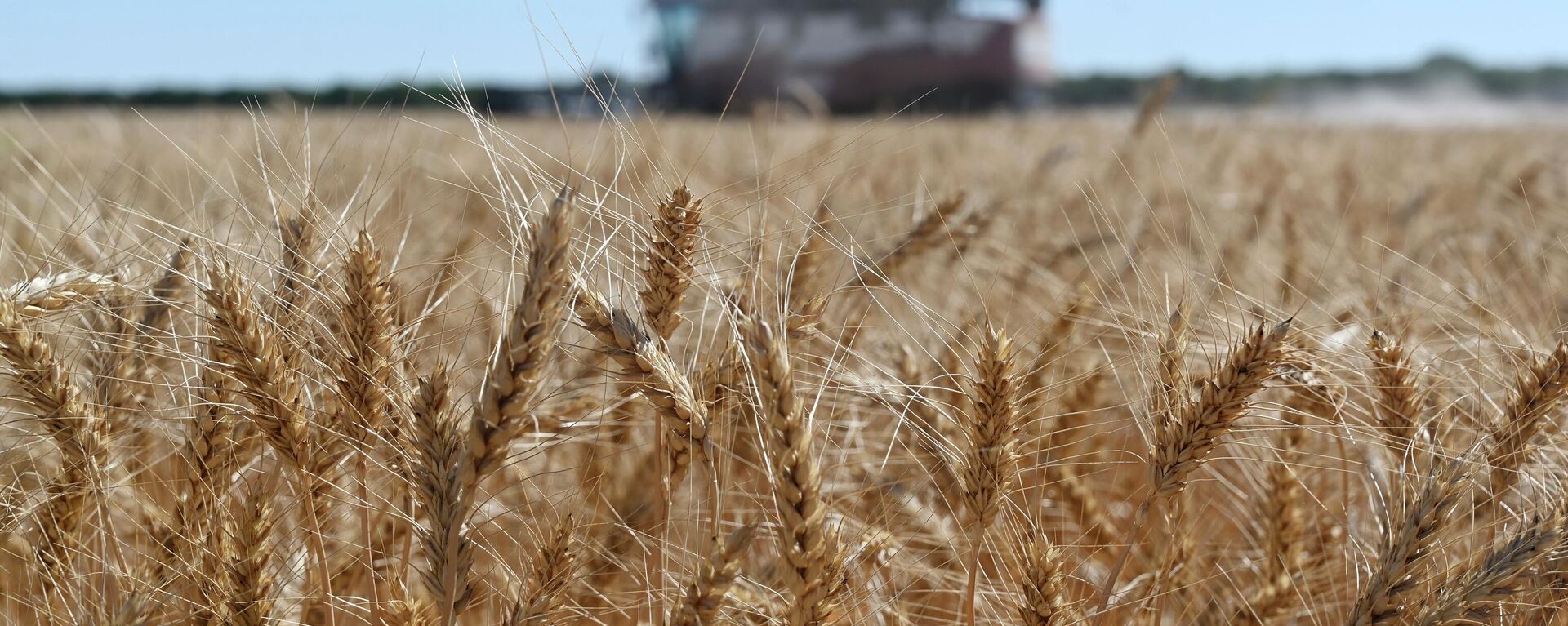https://en.sputniknews.africa/20230717/grain-deal-of-no-strategic-importance-for-africa-cameroonian-economist-1060598601.html
Grain Deal of 'No Strategic Importance' for Africa: Cameroonian Economist
Grain Deal of 'No Strategic Importance' for Africa: Cameroonian Economist
Sputnik Africa
The president of the Russian Grain Union Arkady Zlochevsky has said that the termination of the Black Sea Grain Deal will not affect African countries and... 17.07.2023, Sputnik Africa
2023-07-17T19:07+0200
2023-07-17T19:07+0200
2023-07-18T09:21+0200
west africa
russia
grain deal
opinion
cameroon
africa insight
black sea grain initiative
https://cdn1.img.sputniknews.africa/img/07e7/07/11/1060600918_0:0:2986:1680_1920x0_80_0_0_5e0f7f372af967b41a4f528d9e6ef133.jpg
The significance of the Black Sea Grain Deal for Africa has been exaggerated by the UN and other institutions and does not hold any strategic relevance for the continent, Yamb Ntimba, a Cameroonian economist, writer and philosopher, told Sputnik Africa. According to the expert, cereals are consumed by less than a tenth of Africans, while the vast majority eat locally-grown food.The expert added that "the fact that the UN position expressed by the secretary-general is always discussed in advance with the Westerners is proof that this grain agreement is a big manipulation."Ntimba cited statistics, according to which 47% of grain under the deal went to European countries, 26% to countries with above-average incomes, 27% to the "so-called poor countries," and the poorest countries received a mere 3%. What is a strategic need for Africa, according to the expert, is the distribution of food across the continent, a challenge Russia can assist with. Such logistical projects include building trans-African roads, developing their ports and shipping capacities.Grain Deal FailureThe Russian Foreign Ministry said on Monday that the Black Sea Grain Deal will be terminated as of July 18. Answering Sputnik Africa's question why the West did not fulfill its part of the agreement, Ntimba remarked that "they think they have every right and no duty towards others."According to the economist, since the collapse of the Soviet Union, Western countries have had no intention of normalizing relations with Russia.Therefore, as Ntimba pointed out, to solve the problem once and for all today, it is necessary for Russia "not to renew this agreement, but to work with the Africans on a memorandum, an agenda that enables them to obtain supplies from Russia, and this is the only language that the West understands."Earlier on Monday, Kremlin spokesman Dmitry Peskov said the agreement on the grain deal was de facto canceled, but Moscow will promptly return to its implementation after fulfilling Russia's part of the conditions.
https://en.sputniknews.africa/20230717/why-did-russia-terminate-the-black-sea-grain-deal-foreign-ministry-explains-1060593090.html
west africa
russia
cameroon
Sputnik Africa
feedback@sputniknews.com
+74956456601
MIA „Rossiya Segodnya“
2023
Maxim Grishenkin
https://cdn1.img.sputniknews.africa/img/07e7/0a/17/1063018107_0:0:1104:1103_100x100_80_0_0_03090c85a11f5d2e8a19cf1d989443c9.jpg
Maxim Grishenkin
https://cdn1.img.sputniknews.africa/img/07e7/0a/17/1063018107_0:0:1104:1103_100x100_80_0_0_03090c85a11f5d2e8a19cf1d989443c9.jpg
News
en_EN
Sputnik Africa
feedback@sputniknews.com
+74956456601
MIA „Rossiya Segodnya“
Sputnik Africa
feedback@sputniknews.com
+74956456601
MIA „Rossiya Segodnya“
Maxim Grishenkin
https://cdn1.img.sputniknews.africa/img/07e7/0a/17/1063018107_0:0:1104:1103_100x100_80_0_0_03090c85a11f5d2e8a19cf1d989443c9.jpg
west africa, russia, grain deal, cameroon, africa insight, black sea grain initiative
west africa, russia, grain deal, cameroon, africa insight, black sea grain initiative
Grain Deal of 'No Strategic Importance' for Africa: Cameroonian Economist
19:07 17.07.2023 (Updated: 09:21 18.07.2023) Longread
The president of the Russian Grain Union Arkady Zlochevsky has said that the termination of the Black Sea Grain Deal will not affect African countries and assured that Russian grain supplies to African countries do not depend on the implementation of the deal.
The significance of the Black Sea Grain Deal for Africa has been exaggerated by the UN and other institutions and does not hold any strategic relevance for the continent, Yamb Ntimba, a Cameroonian economist, writer and philosopher, told Sputnik Africa.
According to the expert, cereals
are consumed by less than a tenth of Africans, while the vast majority eat locally-grown food.
"The rhetoric of the UN, the World Food Programme and the FAO gives the impression that people in Africa sit on stones or sand dunes and don't work. But this is not true!" Ntimba said. "90% of the African population eat yams, millet, sorghum, macabo, taro, potatoes, plantain. They don't eat wheat, they don't even know what it is. So I think this UN rhetoric has to stop."
The expert added that "the fact that the UN position expressed by the secretary-general is always discussed in advance with the Westerners is proof that this grain agreement is a big manipulation."
In this vein, as the economist noted, Russia's extension of the grain deal by almost half would play into the hands of the West.
Ntimba cited statistics, according to which 47% of grain under the deal
went to European countries, 26% to countries with above-average incomes, 27% to the "so-called poor countries," and the poorest countries received a mere 3%.
"And out of that 3%, Africa didn't even get maybe half. So I don't really understand why people are making such a big deal of the fact that Russia needs to be pushed to renew this agreement," the pundit stressed. "From Africa's point of view, this agreement has no strategic importance whatsoever! None whatsoever!"
What is a strategic need for Africa, according to the expert, is the distribution of food across the continent, a challenge Russia can assist with. Such logistical projects include building trans-African roads, developing their ports and shipping capacities.
The Russian Foreign Ministry said on Monday that the Black Sea Grain Deal will be terminated as of July 18.
The agreement was signed by Russia, Turkiye, Ukraine and the UN in July 2022 to provide a humanitarian sea corridor for ships exporting food and fertilizers from Ukrainian ports. As Moscow has repeatedly noted, the second part of the agreement - a three-year memorandum between Russia and the UN - was never implemented.
Answering Sputnik Africa's question why the West did not fulfill its part of the agreement, Ntimba remarked that "they think they have every right and no duty towards others."
According to the economist, since the collapse of the Soviet Union, Western countries have had no intention of normalizing relations with Russia.
"Clearly, they have no desire to meet any of Russia's conditions, because all the steps they've taken towards Russia since the 1990s have been to humiliate it, to skin it, to turn it into a banana republic, just as they did in Africa and South America," the expert underlined.
Therefore, as Ntimba pointed out, to solve the problem once and for all today, it is necessary for Russia "not to renew this agreement, but to work with the Africans on a memorandum, an agenda that enables them to obtain supplies from Russia, and this is the only language that the West understands."
Earlier on Monday, Kremlin spokesman Dmitry Peskov
said the agreement on the grain deal was de facto canceled, but Moscow will promptly return to its implementation after fulfilling Russia's part of the conditions.



